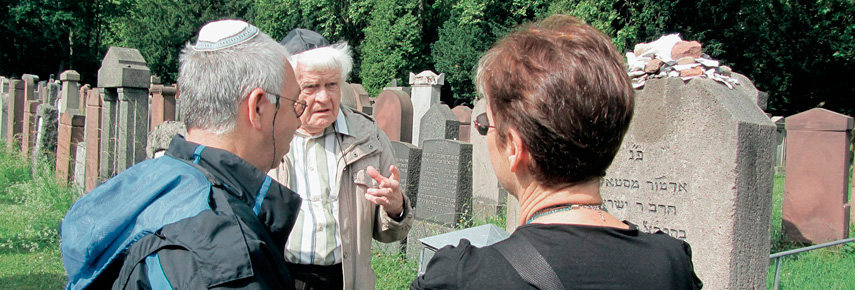BIOGRAPHICAL NOTES
Carol Fels, née Eis, lives in California
Father: Max Eis, born 1911 in Frankfurt
Sister: Andrea Jacobs, née Eis, participation in visitation program 2012
Margaret (Margie) Eis Aghion, née Eis, lives in New York
Father: Moritz Eis, born 1914 in Frankfurt
Mother: Edith Günzburger, born 1921 in München
Grandparents:
Leopold Eis, born 1873 in Bingen
Leah Liebersohn, born 1890 in Odessa
Participation in visitation program: 2013
Address in Frankfurt: The Eis family lived in the Ostend in Frankfurt
Persecution: After November, 9th, 1938 Leopold and Max Eis were deported to Buchenwald,
Moritz was deported to Dachau.
Emigration: After the release of Leopold, Max and Moritz the family emigrated to Shanghai and later to the USA. Carol and Margie were born there after the war.
Sources:
- Beate Götz, Arbeitskreis Jüdisches Bingen, oral information.
- Moritz (Maurice) Eis, My Memoir 1914 – 2004, unpublished manuscript.
- Projekt Jüdisches Leben in Frankfurt (PJLF): Carol Fels und Margie Eis Aghion, oral information.
Photos: Gaby Thielmann and Robert Heckert
Text: Gaby Thielmann
The Eis-Family: Carole Fels and Margaret Eis Aghion
Arduous journey from Germany via Shanghai to the USA
By Gaby Thielmann
In 2013 Carol Fels and her cousin Margie Eis Aghion followed the invitation of the City of Frankfurt to get to know the origins of their family. They knew that their grandparents, who earned their living in the antique business, had two sons Max and Moritz, and a daughter named Martha. Especially Moritz detested the restrictions Jews had to suffer in the 1930s and applied for a visa to the USA in 1936. Due to a quota, the visa could not be issued for four years.
The humiliations that he, his father and his brother Max had to endure in the concentration camps Buchenwald and Dachau after November 9, 1938 forced Moritz to act quickly and to leave the country at the end of the year for Shanghai. Later all the other members of the family managed to escape to China.
In 2013 Carol Fels and her cousin Margie Eis Aghion, the daughters of Max Eis and and his brother Moritz Eis, visited Frankfurt. A year before, Andrea Jacobs, the elder sister of Carol, had already taken part in the visiting program. Therefore a great deal about the Eis family had already been researched: The grandfather Leopold originally came from Bingen (Rhine valley), the family lived in Frankfurt during the Nazi era, Moritz managed to escape to China. Soon later his parents, his sister Martha, and the brother Max with wife and son followed him to China.
Both cousins gave a lively presentation of their family´s fate at a class in the Ziehenschule and more details were revealed in addition to the information received in 2012 during the visit of Andrea, Carol´s sister and Margie´s cousin.
Visit to Bingen
We made an excursion to Bingen to see where grandfather Leopold had spent his youth. Mrs Beate Goetz, a voluntary member of the Initiative Jewish Bingen, walked with us around the centre of Jewish Bingen, which used to have three synagogues.
In 1940 about 5 % of the inhabitants of Bingen belonged to the Jewish community and the citizens of Bingen today are interested in preserving this Jewish heritage. Basic parts of the newest and largest synagogue, that was built in 1905, still exist, but only the model shows its original splendour. Some of its rooms are used today by the Initiative Jewish Bingen, and other ones by the fire brigade and other organizations.
Walking up the hill for quite a while, we finally reached the Jewish cemetery high above the Rhine valley. Carol and Margie were very impressed and found different graves of the widespread Eis family.
Harrowing experiences in Dachau and Buchenwald
Moritz had applied for a visa to the USA in 1936. Due to a quota, the visa could not be issued for four years. To speed up the process, he had asked relatives in Detroit for an affidavit. But they could not help him immediately, because they did not have the required funds and had to ask other relatives for help. In the meantime while waiting for his affidavit and the visa Moritz bought an open ticket from the American-Hapag Shipping line to New York.
After the Novemberpogrom in 1938 Carol’s father Max and her grandfather Leopold had been taken to the Buchenwald concentration camp. Moritz was deported to Dachau. Their stay there was tough and humiliating. Moritz wrote in his memoirs that the captives had their heads shaved in Frankfurt. In Dachau the prisoners only got a very thin soup and one piece of bread a day. They were only allowed to wear a thin shirt and trousers despite of the winter cold. Lightly dressed and undernourished the prisoners had to stand in the assembly place from 4 o’clock in the morning until all 25.000 men had been registered.
Margie´s and Carol´s grandmother, Leah tried everything in her might to get her husband, Leopold and her sons released. Several times she went to the Gestapo (Secret Police) and showed them the tickets for a ship passage that Moritz had bought in 1936 – she wanted to prove, that Moritz was planning to leave Germany. She persisted and offered the Nazi officers valuable pieces from the family’s antique shop: “You can have everything!” Finally the men were released. Moritz was given ten days to leave Germany.
China instead of USA
But he did not have a visa for America and he could not think of any other place he could go. While applying for a passport, he met a stranger at the office who informed him that Shanghai did not require visas. So he decided to postpone his plans for emigration in the USA and to flee to China. He returned his ticket to New York, which was of no use without a visa, and bought a ticket with Lloyd Triestino from Genoa to Shanghai. As soon as he arrived he sent a telegram to his relatives in Detroit to send the affidavit to Shanghai and one to his parents telling them to come to Shanghai.
Max Eis: “Don’t ever ask me!”
Whenever Carol asked her father, Max about the difficult times in Germany, the eight years of poverty in Shanghai and the start of a new life in the USA he only answered: “Don’t ever ask me! His life maxim was: “I have to work, I have to survive, we have to stay together!” He built himself a successful life in the United States and about 20 years ago he visited Germany for the first time since he left.
Moritz and Edith Eis
In the nineteen-nineties Margie’s parents, Moritz and his wife Edith, were asked by Stephen Spielberg whether they would give a testimonial for the Shoah Project. This prompted Moritz to write “My Memoirs” and he started to talk to his family about his experience. Margie is therefore more informed about the family´s story than her cousins Andrea and Carol, the daughters of Max.
Moritz could even share his memories with his wife Edith, who like him escaped the Holocaust. Edith comes from a Jewish family by the name of Günzburger who lived in Memmingen in the Allgäu region. In spite of the threat posed by the Nazi regime her parents did not want to leave their home and property. One of her brothers escaped to Palestine. Edith was sent to Sweden, where she met up with her grandmother who had already lived in New York. They both travelled across Siberia to Wladiwostok. From there they went to Japan and took a ship to the USA.
In the meantime Moritz´s relatives in the States sent the affidavit for the visa and he was able to leave Shanghai for the USA in September 1940. On the ship he met Edith Günzburger, his future wife. But they went separate ways after they landed. Moritz settled in Detroit and Edith stayed with relatives in Chicago.
The war
Five months after his arrival Moritz enlisted in the army because that was the quickest way to become an American citizen. Before his family could join him though, the United States entered the II World War. In summary proceedings he was naturalized before he was deployed to Great Britain at the end of 1942.
He witnessed the bombing of London between January and June 1944, took part in the invasion at Omaha Beach in the Normandy on D-Day, June 6, 1944, and at the Battle of the Bulge in the winter of 1944/1945. He lived to see the end of the war in Pilsen, Czechoslovakia.
Moritz was a medic and survived the war under dire circumstances. The army asked him to volunteer as an interpreter for the Nuremberg Trials. He declined because he wanted to get back as soon as possible and work., for his family was still waiting in Shanghai. So he left Le Havre on a boat to Boston.
After World War II – The family is reunited
Moritz returned to Detroit and after serving in the army for 4 years and 9 months received an honorary discharge and several medals. He turned to the Immigration and Naturalization Department in Detroit to ask for an entry visa for his parents, his sister, and his brother with wife and child. Moritz had $ 6,000.00 and the official in charge told him that it was not enough for the entry visa. When Moritz showed him his discharge paper and the medals, that proved he had served in the army, he was granted the entry visa.
He met Edith again and they got married. Her family had suffered a terrible fate. Both parents had been murdered. An uncle, who was married to a Catholic, was hidden by neighbours for a while, but he was denounced and deported to a concentration camp. Completely emaciated he and his wife returned to their home in Memmingen and continued the textile business of the family Günzburger.
Later Moritz and Edith often travelled to Memmingen. Moritz travelled to Germany without feeling hate towards the Germans because he had achieved what he had always wished for ever since he had been a ten year old boy: He was living in the USA and he had become an American citizen.
The daughters’ visit
Carol and Margie came to Frankfurt with the same attitude and feel no resentment. They wanted to talk to students about the story of their families. They were amazed how the city of Frankfurt acknowledges its history and to what extent the topic Holocaust is dealt with at schools. The visitors pointed out that it is no problem to be Jewish in the USA. Carol and Margie feel safe with their families and are happy about their life that their ancestors had fought so hard for.

